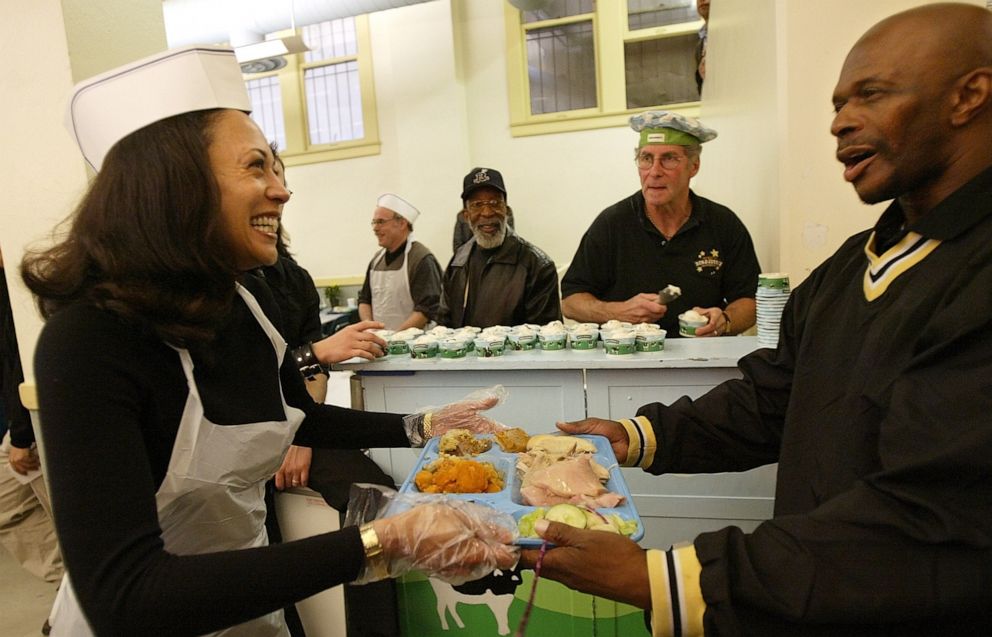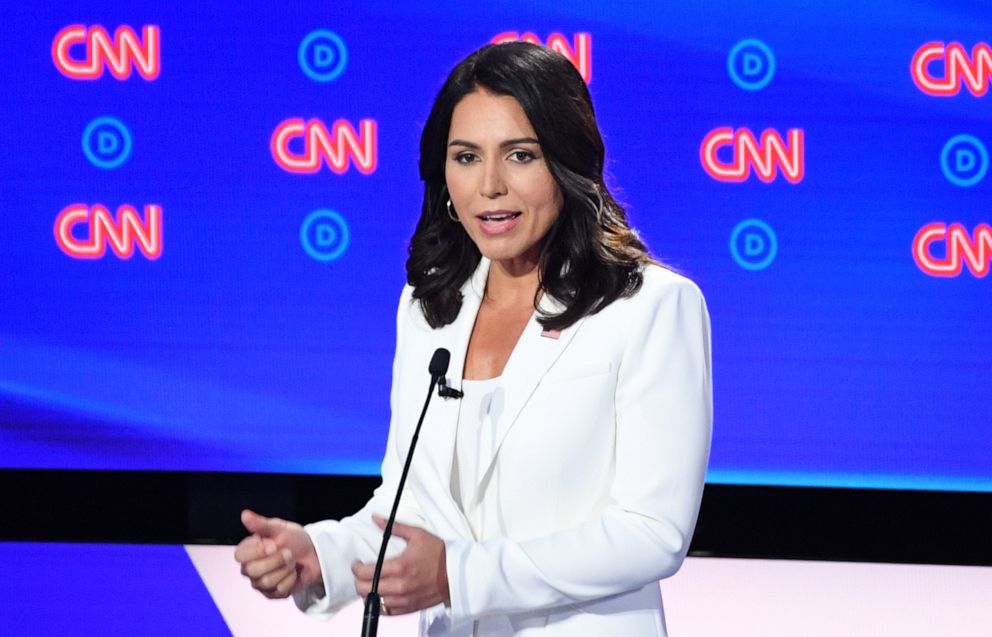Kamala Harris' dual roles, 'mixed record' with the death penalty
Kamala Harris has a varied record on the death penalty, despite her claims.
When Rep. Tulsi Gabbard used the spotlight of the debate stage recently to accuse Sen. Kamala Harris of withholding key evidence that would have "freed an innocent man from death row" during her time serving as California attorney general, Harris fired back a stern retort.

"My entire career I have been opposed -- personally opposed -- to the death penalty," Harris said. "And that has never changed."
Harris has consistently voiced that view. But advocates on both sides say her actual approach to cases involving the death penalty -- long a politically treacherous issue in California -- has been far more complicated.
"There's a mixed record," said Robert Dunham, executive director of the Death Penalty Information Center. "There are instances where as district attorney she decided not to seek the death penalty and there are other instances where she as attorney general took steps that made it more difficult for a potentially innocent person to get access to evidence that could get to the truth."
"Ultimately," Dunham told ABC News, "the judgment for the voter is to try to determine whether the candidates' beliefs are genuine."
Harris' campaign directed ABC News to the senator's previous comments on the death penalty when reached for this article.
Harris has at times appeared to balance a deep personal distaste for the ultimate punishment with the political realities of campaigning to be a local and state prosecutor.
"No exception"
During her 2004 bid for the office of San Francisco district attorney, Harris was a rising political star who campaigned in part on the promise that she would never seek the death penalty. It was a popular stance with voters there. But it was a promise that would almost immediately be tested.
Harris was just three months into the job when a 22-year-old gang member named David Hill shot and killed a young, on-duty police officer, Isaac Espinoza. Calls for the death penalty rang out from community members and politicians alike.
Two days after Espinoza's death and two days before Espinoza's funeral, Harris held a joint press conference with the then-head of the San Francisco police union, where she announced that she would not seek the death penalty for Hill.
The decision ignited outrage and reportedly blindsided Espinoza's family, who later told CNN they did not know of Harris' decision until she announced it publicly. At Espinoza's funeral, Sen. Dianne Feinstein called out Harris for her decision.
"This is not only the definition of tragedy, it's the special circumstance called for by the death penalty," said Feinstein, earning a standing ovation from uniformed officers in attendance.

Harris defended her decision in a 2004 op-ed in the San Francisco Chronicle.
"For those who want this defendant put to death, let me say simply that there can be no exception to principle," Harris wrote at the time.
Hill was found guilty and remains at a maximum security California state prison. He told CNN recently that he was "forever grateful" to Harris for her decision not to seek the death penalty in his case.
"It took a lot of courage and integrity to make a campaign promise like that -- and then keep it," Hill told CNN.
The case appears to remain at the forefront of Harris' mind. She seemed to be alluding to Espinoza's case on stage at the debates in her response to Gabbard.
"I dare anybody who is in a position to make that decision, to face the people I have faced to say, 'I will not seek the death penalty,'" Harris said on stage. "That is my background. That is my work."
A move to block a DNA test
In 2010, Harris had ascended to a larger political stage, becoming California's top prosecutor.
Capital punishment has long been a divisive issue statewide. Polling currently shows that 61% of Californians support the death penalty as a "possible punishment for serious crimes".
The case that Gabbard may have been referring to on the debate stage was that of convicted murderer Kevin Cooper, who was sentenced to death for a quadruple homicide in San Bernadino, California, in 1983.
When asked by ABC News whether Cooper's case was what Gabbard was referring to during the debate, an aide for Gabbard's campaign said that Cooper was one "of the names of people Kamala Harris tried to keep in prison even though there was evidence to suggest they might be innocent." The aide also listed the names of other individuals who are not on death row and not discussed in this reporting.
Cooper was convicted of killing a couple, their young daughter and her friend -- a young boy who was sleeping over at the family's home in Chino Hills, California. The couple's 8-year-old son survived the attack and was found with a knife wound across his neck.
During the sentencing phase of the case and in later appeals, Cooper's attorney alleged that evidence had been tampered with or manipulated, and the defense argued that the description of the attacker offered by the only surviving victim did not resemble Cooper.
The then 8-year-old victim said in his videotaped testimony that he believed three men who had visited his home earlier that night could have been the attackers, but did not testify that multiple people were present during the attack. The victim would later testify before a court against Cooper.
What followed was a lengthy battle by Cooper's attorneys to appeal the case, first to state courts and then to the Ninth Circuit Court of Appeals.
In 2004, two days prior to his scheduled execution, an appeals court stayed Cooper's impending execution and his lawyers filed a new appeal.
In 2009, a panel of Ninth Circuit Court of Appeals rejected Cooper's appeal 2-1.
Cooper's attorney's then motioned to have the appeal re-heard before the entire bench of Ninth Circuit judges, a motion which was also denied. Five judges opposed that denial in a strongly worded dissent.
"The State of California may be about to execute an innocent man," the dissenting opinion said.
The question of Harris' actions surfaced later -- when Cooper and his lawyers asked the state to approve additional DNA testing, which they argued could exonerate him. Harris' team did not take up the case, and evidence from the crime scene was never re-examined while Harris held state office.
Cooper's attorney objected to the decision, citing it in a 2016 clemency request.
"Advanced forensic testing is now available that could show that Mr. Cooper is innocent of these crimes, but the State refuses to permit it," Cooper's attorney wrote.
Harris has since changed her views on Cooper's request. After a lengthy New York Times examination of the case, she issued an emotional statement, telling the Times she felt "awful about this."
Harris shared the Times' piece on her Facebook page in 2018.
"As a firm believer in DNA testing," she wrote in the post, "I hope the governor and the state will allow for such testing in the case of Kevin Cooper."
But by then she had moved on to the U.S. Senate and was powerless to act.
Earlier this year, California Gov. Gavin Newsom issued an executive order directing that the evidence be tested for DNA. Cooper is awaiting the results in a San Quentin facility and has not been exonerated. He is still on death row, though in March Newsom declared a moratorium on the death penalty in the state.
Cooper has won himself an advocate in reality star Kim Kardashian West in recent weeks. In May, Kardashian posted a photo of herself with Cooper.
Anti-death penalty advocates up in arms
Harris had another brush with the long-running death penalty debate in 2014, when a California U.S. District Court judge issued a ruling that would have effectively eliminated the death penalty in the state.
The case involved death row inmate Ernest Dewayne Jones, who had been convicted in 1995 for raping and stabbing his girlfriend's mother in Los Angeles.
U.S. District Court Judge Cormac J. Carney overturned Jones' death sentence, arguing that the time he had spent in a state of uncertainty waiting for execution on death row was a form of cruel and unusual punishment. In his ruling, Carney argued that the death penalty was unconstitutional. The precedent set by Jones' case would have allowed for further legal and political decisions that anti-death penalty advocates said could ultimately lead to the elimination of the death penalty in California.
As the state's attorney general, Harris decided to appeal the ruling, representing the state's Department of Corrections.
"I am appealing the court's decision because it is not supported by the law, and it undermines important protections that our courts provide to defendants," Harris said at the time.
A three-judge panel sided with Harris, and overturned the lower court ruling.
Harris' decision prompted pushback from her allies in the movement against capital punishment. Anti-death penalty advocates publicly questioned why she fought to overturn a ruling that could have helped to wipe out the death penalty statewide.
Law professor Hadar Aviram of the University of California, Hastings circulated a petition after Carney issued his decision. The petition urged Harris and then Gov. Jerry Brown not to appeal the case during the 45-day window in which appeals are allowed. The petition appeared to be gaining traction, but then, not long before the close of the appeal deadline, Harris' team filed its petition.
Aviram said he was dismayed to learn of Harris' appeal.
"I was disappointed and surprising that they put their energy and zeal into essentially fighting for the death penalty, fighting for keeping the death penalty and staying away from a chess move that could have moved us further along toward abolition," he said. "It was especially disappointing coming from two public officials who essentially are personally opposed to the death penalty."
Harris said in a 2014 written statement that she sought the appeal because the ruling was "flawed."
"I am appealing the court's decision because it is not supported by the law, and it undermines important protections that our courts provide to defendants," Harris wrote at the time. "This flawed ruling requires appellate review."
Where does Harris stand now?
Now on the campaign trail, Harris notes in her new book, "The Truths We Hold," that she's faced scrutiny for her anti-death penalty stance her whole public career.
Harris wrote in the book about facing criticism during her run-up to the 2010 California state attorney general election for being "a woman who is a minority who is anti-death penalty."
On the debate stage and elsewhere, Harris maintains that she is and has always been an anti-death penalty candidate. And her current campaign platform supports that notion, stating that Harris will "seek a federal moratorium on the death penalty."




